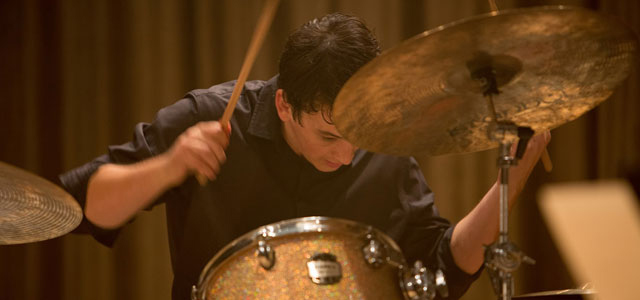(MA) Miles Teller, J.K. Simmons, Paul Reiser, Melissa Benoist
All too often movies about music and musicians restrict their focus to the importance of finding and retaining ones passion, soul, creativity, and love for the art. Rarely do films attempt to explore the other side of the equation. With Whiplash writer-director Damien Chazelle draws on his own experiences as a driven high school jazz drummer to examine the determination, perfectionism, obsession and back-breaking hard work that that is required to be the very best.
Nineteen-year-old Andrew Neyman is a jazz drummer in his first year at New York’s prestigious Shaeffer Conservatory of Music. Neyman is good. He is very good. But he wants to be great. After a chance evening encounter with Terence Fletcher, the infamous conductor of the conservatory’s award winning studio band, Neyman finds himself shockingly transferred into the band as the alternate drummer. Fletcher is more drill sergeant than music teacher but he is the best there is and the students know it. But is the combination of Fletcher’s psychological brinksmanship and Neyman’s determination to be the best leading the young drummer towards greatness or madness?
At what point does drive become obsession? When does determination go from being an admirable quality to being a repugnant one? At what point does the quest for perfection become counter-productive? We watch Neyman try and fail, and try again. We see him drumming until his hands blister and bleed. Yet rather than cheer him on, we become conflicted by his drive. His single-mindedness makes him selfish. His need to accept nothing but the very best from himself makes him incapable of acknowledging more ordinary achievements and aspirations in other people. His progress as a musician seems to be to the detriment of his development as a person.
Whiplash has the potential to stir up some debate with its controversial depiction of the student-mentor relationship. Fletcher’s aim is to push his students beyond what is expected of them. In his mind it is only then that greatness can emerge. Comfort and contentment breed mediocrity. There are no two more harmful words, he says, than ‘good job.’ But at what point does motivation and pushing just become abuse? For Fletcher, fear and humiliation are powerful motivating tools. They provide the heat and the pressure with which a diamond can be forged.
At the centre of this film are two powerful performances, one from a young actor on the rise the other from a long-time character actor given the role of his career. Miles Teller and J.K. Simmons deliver complex characters that are equal parts repellent and engrossing.
As much as the clashing egos of Neyman and Fletcher seem destined to destroy each other, they are one and the same, entirely co-dependent. Fletcher’s methods don’t work unless a student is headstrong enough to persevere through them. Neyman can’t continue to improve unless he has someone who can push him beyond what he thinks he’s capable of. So dedicated are they both, so high are their standards, that eventually they have only each other.
Chazelle and his director of photography Sharone Meir shoot bands and musicians brilliantly. The director wanted to make a movie about music that felt like a war movie and he really has achieved that. The rehearsals feel like battles. The performances play like action set pieces, edited for maximum intensity.
You don’t have to know jazz in order to appreciate this explosive film because ultimately the movie is not about jazz. It is not even about music. Whiplash is an emotionally and psychologically brutal film about the dangers of perfectionism and single-minded obsession.
Duncan McLean












